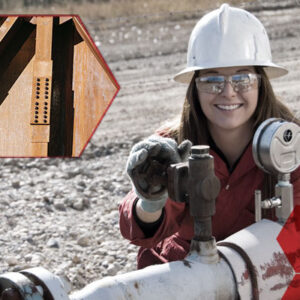Protecting Petroleum Infrastructure: Coating Inspectors Crucial Role in Mitigating Corrosion and Ensuring Efficiency
Introduction

In the realm of petroleum infrastructure protection, the role of coating inspectors stands as a critical linchpin. As guardians of corrosion mitigation and efficiency assurance, these professionals hold significant sway over the longevity and functionality of vital petroleum assets. This article delves into the indispensable duties and responsibilities carried out by coating inspectors within the petroleum industry. By exploring their role in safeguarding infrastructure through meticulous inspection and maintenance of protective coatings, we unravel the intricate fabric of their contribution to the sector’s operational integrity and longevity.
Brief overview of the petroleum industry

The petroleum industry stands as a cornerstone of modern civilization, powering economies and facilitating various aspects of daily life. From fueling vehicles to generating electricity and producing petrochemicals, its influence is pervasive. Within this industry, a complex network of infrastructure, including pipelines, tanks, and refineries, facilitates the extraction, transportation, and processing of crude oil and natural gas.
The infrastructure of the petroleum industry is subjected to harsh environmental conditions, chemical exposure, and mechanical stress, rendering it susceptible to corrosion. Corrosion, in the context of petroleum infrastructure, refers to the gradual degradation of materials due to chemical reactions with the surrounding environment. This degradation compromises structural integrity, leading to leaks, ruptures, and other safety hazards.
Given the high stakes involved, preventing corrosion and maintaining infrastructure integrity is a top priority. One of the primary methods employed for corrosion prevention is the application of protective coatings. These coatings act as a barrier between the corrosive environment and the underlying substrate, inhibiting corrosion and extending the lifespan of the infrastructure.
Importance of coatings in petroleum infrastructure

Within the intricate web of petroleum infrastructure, coatings serve as a frontline defence against corrosion. This pervasive threat can compromise structural integrity, lead to leaks, and incur substantial economic losses. Coatings act as protective barriers, shielding surfaces from corrosive elements present in harsh environments such as saline waters, chemical residues, and atmospheric pollutants.
The application of coatings, however, necessitates precision and adherence to rigorous standards to ensure efficacy and longevity. This is where coating inspectors assume a pivotal role. Coating inspectors are tasked with verifying the quality, thickness, adhesion, and uniformity of applied coatings through meticulous examination and testing protocols. Their expertise is crucial in identifying potential defects, such as pinholes, cracks, or insufficient coverage, which could compromise the protective function of coatings and accelerate corrosion.
By conducting comprehensive inspections at various stages of coating application, from surface preparation to final curing, coating inspectors contribute to the prevention of corrosion-related failures and the preservation of infrastructure integrity. Moreover, their assessments facilitate compliance with regulatory requirements and industry specifications, fostering a culture of safety, reliability, and environmental stewardship within the petroleum sector.
Pain Points in the Petroleum Industry

The petroleum industry faces numerous challenges, particularly concerning the integrity of its infrastructure. One of the most significant issues is corrosion, which can lead to leaks, spills, and significant environmental damage. Corrosion occurs when metals react with their environment, causing degradation over time. In the context of petroleum infrastructure, this corrosion can occur in pipelines, storage tanks, and other vital components.
Corrosion poses a substantial threat to the efficiency and safety of petroleum operations. It can weaken infrastructure, leading to structural failures and costly repairs. Moreover, corrosion-related incidents can result in production downtime, financial losses, and reputational damage for companies involved in the petroleum industry.
Another pain point is the complex and expansive nature of petroleum infrastructure. Pipelines, refineries, offshore platforms, and storage facilities comprise a vast network that spans across regions and often operates in harsh environmental conditions. Managing and maintaining this infrastructure requires significant resources and expertise.
Solutions to the Petroleum Industry

Addressing the challenges faced by the petroleum industry requires a multifaceted approach, with a focus on preventive measures, efficient maintenance practices, and regulatory compliance. One crucial solution lies in the role of coating inspectors in mitigating corrosion and ensuring the longevity of petroleum infrastructure.
Coating inspectors play a crucial role in implementing protective measures to prevent corrosion. They are responsible for inspecting and assessing the condition of coatings applied to infrastructure components such as pipelines, storage tanks, and offshore platforms. These coatings act as a barrier between the metal substrate and the corrosive elements present in the environment, thus helping to preserve the integrity of the infrastructure.
By conducting regular inspections, coating inspectors can identify early signs of coating degradation or failure. This proactive approach allows for timely maintenance and repair interventions, preventing corrosion from spreading and causing more extensive damage. Additionally, coating inspectors ensure that new coatings are applied correctly, adhering to industry standards and specifications.
High-Quality Coatings
The selection of high-quality coatings is fundamental in safeguarding petroleum infrastructure against corrosion and degradation. Coating inspectors are instrumental in ensuring that only the most suitable and durable coatings are applied. High-quality coatings exhibit superior resistance to corrosive elements commonly encountered in petroleum environments, including moisture, chemicals, and abrasion.
Coating inspectors meticulously evaluate coating specifications, verifying adherence to industry standards and compatibility with substrate materials. Additionally, they oversee the application process to guarantee proper surface preparation and coating thickness, essential factors influencing coating performance. By advocating for the use of high-quality coatings, inspectors mitigate the risk of premature coating failure, thereby enhancing the longevity and reliability of petroleum infrastructure.
Regular Maintenance and Inspection

Regular maintenance and inspection form the cornerstone of effective corrosion mitigation strategies in petroleum infrastructure. Coating inspectors play a central role in implementing comprehensive maintenance programs tailored to the specific needs of each facility. Through periodic inspections, inspectors monitor the condition of protective coatings, identifying areas of concern and potential vulnerabilities.
This proactive approach allows for timely remediation measures to be implemented, preventing corrosion-induced failures and costly downtime. Moreover, coating inspectors collaborate closely with maintenance teams to schedule routine inspections and prioritize maintenance activities based on risk assessment. By advocating for a culture of regular maintenance and inspection, inspectors contribute significantly to the overall efficiency and reliability of petroleum infrastructure, safeguarding critical assets and minimizing operational disruptions.
Advanced Technologies
In the realm of protecting petroleum infrastructure, staying abreast of advanced technologies is paramount. Coating inspectors play a pivotal role in leveraging these advancements to ensure the efficacy of protective coatings. These technologies encompass a spectrum of innovations, ranging from state-of-the-art coating formulations to cutting-edge inspection tools. For instance, advancements in coating formulations have led to the development of high-performance coatings resistant to harsh environments prevalent in petroleum facilities.
Coating inspectors utilize sophisticated inspection techniques such as infrared thermography and ultrasonic testing to assess coating integrity with precision. By harnessing these advanced technologies, coating inspectors can detect early signs of corrosion or coating degradation, enabling proactive maintenance interventions before issues escalate.
Role of Coating Inspectors

Within the intricate tapestry of safeguarding petroleum infrastructure, coating inspectors occupy a central and indispensable position. Tasked with overseeing the application, maintenance, and performance of protective coatings, these professionals serve as custodians of asset integrity and efficiency. At the heart of their role lies a multifaceted mandate encompassing inspection, evaluation, and remediation.
Coating inspectors are entrusted with the responsibility of conducting comprehensive assessments of coating systems deployed across petroleum infrastructure. Through meticulous visual inspections and advanced NDT techniques, they scrutinize coatings for defects, adhesion issues, and signs of corrosion initiation. Moreover, coating inspectors play a crucial role in ensuring adherence to industry standards, specifications, and regulatory requirements.
By meticulously monitoring coating application processes and quality control measures, they uphold the integrity and efficacy of protective coatings, mitigating the risk of corrosion-related failures. Beyond their role as evaluators, coating inspectors serve as proactive stewards of asset longevity and performance. Through regular monitoring and maintenance activities, they preemptively identify potential corrosion risks and implement corrective measures to mitigate them. Whether through spot repairs, recoating initiatives, or strategic asset management, these professionals orchestrate interventions aimed at preserving infrastructure integrity and functionality.
Conclusion

In conclusion, the role of a coating inspector in protecting petroleum infrastructure from corrosion and ensuring operational efficiency cannot be overstated. Through diligent inspection, adherence to industry standards, and proactive maintenance, coating inspectors play a crucial role in mitigating corrosion risks and preserving the integrity of vital infrastructure. By identifying and addressing potential vulnerabilities in protective coatings, these professionals help to extend the lifespan of equipment and reduce the likelihood of costly downtime or environmental hazards.
Recognizing the significance of their role, organizations should prioritize investment in training and certification programs offered by the Corrosion Institute of Corrosion, ensuring that coating inspectors are equipped with the necessary knowledge and skills to uphold the highest standards of corrosion prevention and asset protection. Ultimately, by valuing the expertise of coating inspectors and empowering them with the tools and resources they need, the industry can safeguard its infrastructure, optimize operational efficiency, and mitigate the potential impact of corrosion-related challenges.
FAQs
Q1. What is the primary role of coating inspectors in the petroleum industry?
Answer: Coating inspectors in the petroleum industry primarily oversee the application, maintenance, and performance of protective coatings on infrastructure components such as pipelines, storage tanks, and offshore platforms. Their role involves ensuring that coatings effectively mitigate corrosion, adhere to industry standards, and comply with regulatory requirements.
Q2. Why are coatings essential for protecting petroleum infrastructure?
Answer: Coatings serve as frontline defences against corrosion in petroleum infrastructure, shielding surfaces from corrosive elements present in harsh environments such as saline waters, chemical residues, and atmospheric pollutants. They help prevent structural degradation, leaks, and ruptures, thereby ensuring the integrity and longevity of vital assets within the petroleum industry.
Q3. What challenges does the petroleum industry face regarding infrastructure integrity, and how do coating inspectors address them?
Answer: The petroleum industry faces challenges such as corrosion, which can weaken infrastructure, cause structural failures, and lead to costly repairs and downtime. Coating inspectors address these challenges by implementing preventive measures through regular inspections, identifying early signs of coating degradation or failure, and facilitating timely maintenance interventions to mitigate corrosion risks.
Q4. How do coating inspectors ensure the quality of protective coatings applied to petroleum infrastructure?
Answer: Coating inspectors ensure the quality of protective coatings by meticulously evaluating coating specifications, verifying adherence to industry standards, and overseeing the application process to guarantee proper surface preparation and coating thickness. They utilize advanced inspection techniques such as infrared thermography and ultrasonic testing to assess coating integrity with precision.
Q5. What is the significance of investing in coating inspectors for sustainable petroleum operations?
Answer: Investing in coating inspectors is crucial for sustainable petroleum operations as they play a pivotal role in safeguarding infrastructure integrity, minimizing corrosion-related failures, and ensuring operational efficiency. By identifying and addressing corrosion risks proactively, coating inspectors contribute to reducing environmental impact, enhancing safety, and maintaining the reliability of petroleum facilities for the long term.
Image Reference: Freepik
Disclaimer: All trademarks, logos, and brand names are the property of their respective owners. All company, product, and service names used in this website are for identification purposes only. Use of these names, trademarks, and brands does not imply endorsement.

